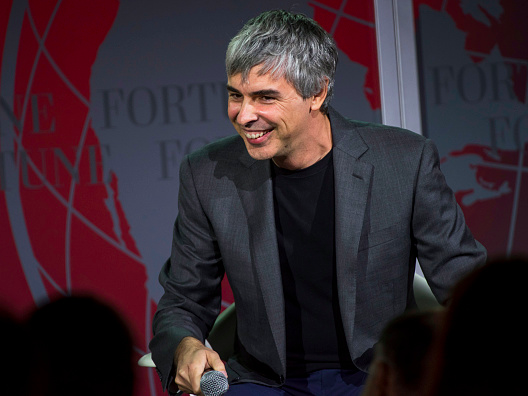Alphabet CEO Larry Page is driven by a fierce, relentless ambition.
The cofounder of Google and current CEO of Google’s parent company Alphabet is notoriously unsatisfied by ideas that don’t push technology forward by 10x. Page, along with Google cofounder Sergey Brin, grew the fledgling search engine into the multibillion-dollar technology behemoth it is today.
In honor of Google’s 19th birthday, here are some thoughts from Page himself on strategy, motivation, and the power of Google.
Jillian D’Onfro contributed to an earlier version of this post.
On making a difference: “What is the one-sentence summary of how you change the world? Always work hard on something uncomfortably exciting!”

Source: Google
On invention versus implementation: "Invention is not enough. [Nikola] Tesla invented the electric power we use, but he struggled to get it out to people. You have to combine both things: invention and innovation focus, plus the company that can commercialize things and get them to people."

Source: Ted
On making Google products beautiful: "I do think there is an important artistic component in what we do. As a technology company I’ve tried to really stress that."

Source: Fortune
On possibilities and press coverage: "We're at maybe 1% of what is possible. Despite the faster change, we're still moving slow relative to the opportunities we have. I think a lot of that is because of the negativity... Every story I read is Google versus someone else. That's boring. We should be focusing on building the things that don't exist."

Source: TechCrunch
On what's important: "Lots of companies don’t succeed over time. What do they fundamentally do wrong? They usually miss the future. I try to focus on that: What is the future really going to be? And how do we create it? And how do we power our organization to really focus on that and really drive it at a high rate?"

Source: Ted
On robots replacing humans: "The idea that everyone should slavishly work so they do something inefficiently so they keep their job — that just doesn’t make any sense to me. That can’t be the right answer."

Source: Financial Times
On using money as a motivation: "If we were motivated by money, we would have sold the company a long time ago and ended up on a beach."

Source: Time
On being CEO: "My job as a leader is to make sure everybody in the company has great opportunities, and that they feel they're having a meaningful impact and are contributing to the good of society. As a world, we're doing a better job of that. My goal is for Google to lead, not follow that."

Source: Fortune
On deciding what to work on: "We want to build technology that everybody loves using, and that affects everyone. We want to create beautiful, intuitive services and technologies that are so incredibly useful that people use them twice a day. Like they use a toothbrush. There aren't that many things people use twice a day."

Source: Business Insider
On working with super-smart engineers: "Deep knowledge from your manager goes a long way toward motivating you. And I have a pretty good capability for that."

Source: Fortune
On Google's philosophy versus Apple's: "I used to have this debate with Steve Jobs, and he would always say, 'You guys are doing too much stuff.' He did a good job of doing one or two things really well. We'd like to have a bigger impact on the world by doing more things."

Source: Fortune
On Silicon Valley's focus on consumer tech instead of "breakthrough technologies": "You can make an internet company with 10 people and it can have billions of users. It doesn't take much capital and it makes a lot of money — a really, really lot of money — so it's natural for everyone to focus on those kinds of things."

Source: Financial Times
On the power of Google's cache: "We do benefit from the fact that once we say we're going to do it, people believe we can do it, because we have the resources. Google helps in that way: There aren't many funding mechanisms like that."

Source: Financial Times
On growing Alphabet: "I want to push the envelope for what's possible for an innovative company with large resources."

Source: Reuters
On Google's mobile ambitions: "We feel like right now, computers are still pretty bad. You're just messing around. You're scrolling on your touchscreen phone, and trying to find stuff. You're in a car. It's bouncy, and you can't — it doesn't really work. I think the actual amount of knowledge you get out of your computer versus the amount of time you spend with it is still pretty bad. So I think our job is to solve that, and most of the things we're doing make sense in that context."

Source: Khosla Ventures

